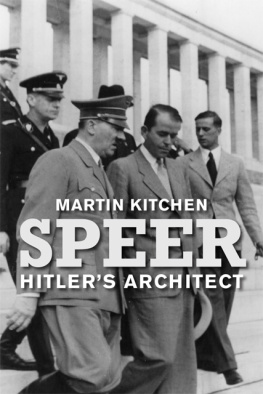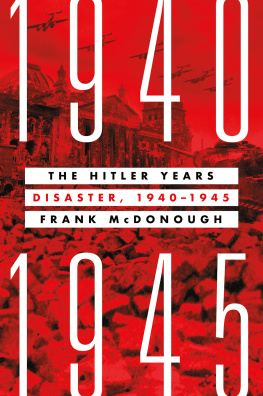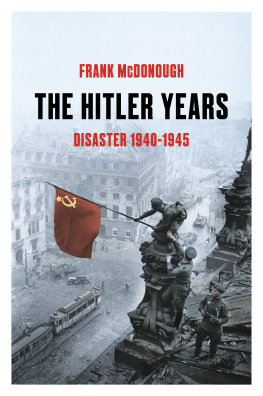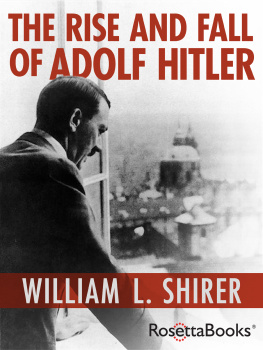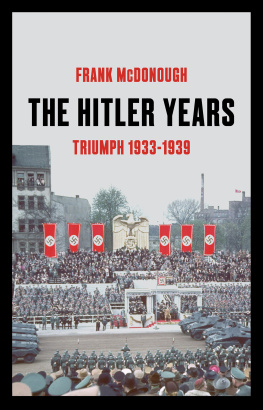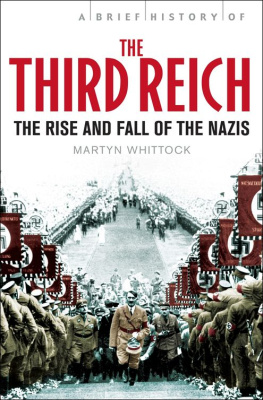
ABOUT THE AUTHOR
Martin Kitchen is one of the worlds leading experts on twentieth-century German history. He was Professor of History at the Simon Fraser University in Canada until his recent retirement. He is the author of The Cambridge Illustrated History of Germany, A Military History of Germany, Nazi Germany at War, and The German Offensives of 1918, also published by Tempus.

MARTIN KITCHEN

First published in 2007
The History Press
The Mill, Brimscombe Port
Stroud, Gloucestershire, GL5 2QG
www.thehistorypress.co.uk
This ebook edition first published in 2012
All rights reserved
Martin Kitchen, 2004, 2007, 2012
The right of Martin Kitchen, to be identified as the Author of this work has been asserted in accordance with the Copyrights, Designs and Patents Act 1988.
This ebook is copyright material and must not be copied, reproduced, transferred, distributed, leased, licensed or publicly performed or used in any way except as specifically permitted in writing by the publishers, as allowed under the terms and conditions under which it was purchased or as strictly permitted by applicable copyright law. Any unauthorised distribution or use of this text may be a direct infringement of the authors and publishers rights, and those responsible may be liable in law accordingly.
EPUB ISBN 978 0 7524 7330 7
MOBI ISBN 978 0 7524 7329 1
Original typesetting by The History Press
CONTENTS
1
GERMANY, HITLER AND THE ORIGINS OF THE NSDAP
20 April 188930 January 1933
INTRODUCTION
How could it possibly have happened? Many a contemporary asked this question in desperation and, many decades later, with tens of thousands of meticulous studies of every aspect of the Third Reich, the answer still eludes us. How could a highly educated, cultured and technically advanced society with a long tradition of the rule of law idolize an ill-educated beer-hall demagogue, a venomous racist, a bigoted philistine, and a sadistic monomaniac? How could a country, which had made such an unsurpassed contribution to European civilization, devote its exceptional skills and energies to a brutal and senseless war of conquest and industrialized mass-murder on a scale that still beggars the imagination?
It is indeed a baffling story. Adolf Hitler was a complete nonentity until the age of thirty. Then for the next 26 years his impact on history was unequalled and indelible. Germany and Germanys victims are still traumatized by his regime, and the wounds that National Socialism opened may never heal.
In the summer of 1932 most political observers were convinced that Hitlers meteoric rise was a spent force. Support for the party dropped dramatically, President Hindenburg refused to appoint him chancellor, and the Nazi movement was rent with dissension. Yet within a few weeks he had been appointed chancellor and contemporaries were dazed by the speed of the national revolution. Within six months the National Socialists had destroyed all other political parties, the trades unions, and every association and club whether of the left or the right. The federal system had been virtually dismantled, local government was firmly in the hands of the party, political opponents real or imagined had been driven out of the civil service, the press muzzled and Germanys estimable Jewish community was submitted to vicious discrimination and shameful indignities. The Big Bad Wolf huffed and puffed and blew the house down with remarkable ease.
The causes of this disaster are highly complex and deeply embedded in German history. It was not a singular event, an accident, an exception, or a political Chernobyl as historians such as Friedrich Meinecke, Gerhard Ritter and Eberhard Jaeckl have argued. Nor did Auschwitz blot out all previous German history, as Jrgen Habermas would have us believe. The Third Reich was not the inevitable outcome of the course of German history from Luther through Frederick the Great to Bismarck and Hindenburg as proponents of the special development (Sonderweg) theory insist. This latter view is as simplistic as the traditional Prussian-conservative view of German history as reaching its apotheosis in the unification of Germany in 1871; a process that many nationalists felt was completed by Hitler in 1938 with the Anschluss of Austria.
This positive and Hegelian view of Germanys historical development was first turned on its head by Edmond Vermeil. He argued that Germany was on the wrong track from the time of the Hohenstaufens with their campaigns in Italy in the twelfth century (a view shared for very different reasons by the nationalist historians of the nineteenth century). A.J.P. Taylor and William Shirer put the blame on Martin Luther and Prussian militarism. Somewhat later, Hans-Ulrich Wehler posed the question why it was that Germany did not develop into a liberal democratic society on the British model.
On closer examination the Sonderweg explains precious little. Every country has its Sonderweg in certain respects, and German economic development, social structure and conflicts, and the opposition of established lites to liberal reform differed little from the experience in Britain or France. Furthermore, the concept of continuity, which comes from the cinema, is profoundly unhistorical in that it results from reading history backwards so that the contingent appears inevitable.
The forces of Ferdinand Braudels longue dure certainly played their part in aiding the rise of National Socialism, but more immediate circumstances were far more important: a lost war and a harsh peace settlement, runaway inflation in 1923 and the long depression that began in 1928, mass unemployment, a perceived communist threat, the collapse of the democratic political system, and above all the roles of the individual actors with their intrigues and grievous errors of judgement. The Republic collapsed, the authoritarian conservative forces were at a loss as to what should be done and the National Socialists seized the opportunity offered by this economic, political and social crisis. The immediate outcome was not inevitable, but it is comprehensible. What happened subsequently is altogether another matter. Historians are neither judge nor jury, but to comprehend in no sense means to condone, and we shall never understand enough about the Nazi dictatorship to be able to forgive. Historical understanding stands mute before the horror of the Shoah; all attempts at explanation are condemned to be facile, glib and impious. It is right and proper that, confronted with this ultimate negation of civilization, the human intellect and imagination should remain painfully baffled.
HITLER AND THE NSDAP: THE EARLY YEARS
Every schoolchild learnt in their National Socialist catechism that: Our Fhrer Adolf Hitler was born in Braunau on the Inn on 20 April 1889. His father was an Austrian customs officer, his mother a housewife. The details of his childhood and youth are shrouded in myth, partly of his own making in Mein Kampf and partly from the recollections of his boyhood friend August Kubizek. Suffice it to say he was brought up in a respectable



